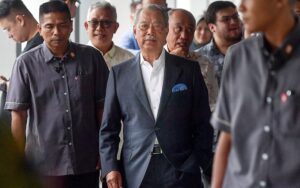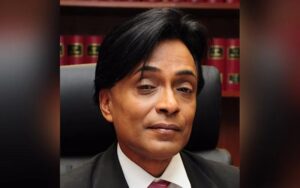By National Young Lawyers Committee | Malaysian Bar
“Focus on quality of committees over numbers”
Amer Hamzah bin Arshad graduated from the University of Leeds, United Kingdom with an LL.B (Hons) in 1997 and thereafter obtained his Certificate of Legal Practice in 1998.
During his relatively short time in practice, he has divided his legal work with activities for the Bar. We sought his comments on certain posers affecting the Bar today.
Why did you choose to be involved in criminal practice?
It’s hard to explain, maybe it’s the passion that I always have. Perhaps, it was the fact that I had to defend myself before a disciplinary panel when I was in my secondary school. Perhaps, it was an overdose of Rumpole of the Bailey. One thing is for sure, the interest to practise criminal law has always been there even since I was in my secondary school.
The National Legal Aid Committee is working on a 5–year plan for legal aid centres in Malaysia. There is an acknowledgment that improvements have to be made. Why do you think that legal aid is important?
We always hear lawyers talking about equality before the law. That every person is equal before the law and is entitled to the equal protection of the law. In reality, this is not entirely true. In a market–driven society like ours, it appears that only the rich and influential are in a financial position to seek the protection of the law. The poor and the underprivileged are, more often than not, left in the lurch without any proper legal representation. It is due to this disparity that we need to set up a permanent state-funded legal aid system. To deny oneself of legal aid is to deny that person of his fundamental right.
Whilst the present Bar Council Legal Aid System does seem noble, it may not be realistic in our present capitalist–like society. Not all lawyers are altruistic. Not all lawyers believe in doing cases on a pro–bono basis although they may believe in the theoretical aspect of it. We must accept the fact that times have changed and that a state-funded legal aid system is an essential part of any modern justice system in a democratic society.
It is hoped that with a state-funded legal aid system which may be modeled along the existing ‘assigned counsel scheme’ for capital offence cases, more lawyers would be encouraged to get involved in legal aid cases.
Prof Alan Dershowitz of the Harvard law School once said that he hoped lawyers will not need laws to tell them that they should represent those most in need of zealous advocacy, without regard to gender, race, ideology, economic situation or popularity. Well, unfortunately we already have such law in the form of the Legal Profession Act, section 42 in particular. Yet the number of lawyers who have come forward to be volunteer lawyers is abysmal compared to the number of lawyers that we have currently.
What does human rights mean to you, and how did you get involved in the first place?
The commonly accepted definition without going into the scholarly debate of human rights is that they are the basic inalienable rights and freedoms to which all humans are entitled.
Human rights and criminal litigation are closely connected. In fact, the underlying principle of representing a person in a criminal court is part and parcel of human rights, ie the right to trial. So my involvement in human rights was a natural progression or evolution from criminal litigation.
You are quite involved in refugee cases in Malaysia. Can you tell us more about this?
I first got involved in a refugee case in 2003, whereby I was instructed to assist a refugee who had been prosecuted in the Magistrate’s Court under section 6(1)(c) Immigration Act. He was not represented at the Magistrate’s Court and had pleaded guilty.
An application for revision was filed, heard and allowed by the High Court, whereby the conviction and sentence were set aside, and the matter remitted back to another Magistrate. The charge was subsequently withdrawn by the Public Prosecutor.
At present, we do not have any specific laws regulating or providing protection to refugees, albeit Malaysia has a long history of rendering humanitarian assistance to refugees such as the Vietnamese Boat–people and the Bosnians. Refugees by definition are victims of human rights violations. Refugees are commonly mistaken for undocumented migrant workers. They are not. Refugees are persons who, owing to a well founded fear of being persecuted for reasons of race, religion, nationality, membership of a particular social group or political opinion, is outside the country of his nationality and is unable or, owing to such fear, is unwilling to avail himself of the protection of that country.
Under international laws, a refugee, unlike an undocumented migrant worker, could not be sent back to his or her country of origin where he or she faces the risk of persecution. This principle is known as the non–refoulement principle.
Since a refugee is a person who flees his country of origin to avoid persecution, it would be akin to rubbing salt into an open wound if he is prosecuted and punished on account of his illegal entry into or presence in the country where he is seeking refuge.
It must be emphasised that the situation of a refugee differs from that of an ordinary alien, who holds a national passport and enjoys the protection of the authorities of his country, to which he may return if he so desires. This is not so in the case of a refugee. Having entered the country in an irregular manner, a refugee is immediately at odds with the authorities of the country of reception. A refugee does not enjoy the luxury of immigration through normal customary channels, and thus find himself compelled to seek asylum by irregular entry to a safe country.
The notion of seeking refuge is not something new. It has long been in existence and has been well documented in the Quran and the Bible. For instance, Prophet Moses had to lead his people across the Red Sea in order to avoid persecution from Pharoah Ramses II, and the Islamic calendar and civilization that we know of today existed due to the historical fact of ‘hijrah’ which is the event where Prophet Muhammad (Peace be Upon Him) fled from Makkah to seek shelter in Medina, in order to avoid persecution from the Quraish people.
Do you think the human rights situation in Malaysia has improved since SUHAKAM was established?
The establishment of SUHAKAM has, in certain ways, increased public awareness on human rights matters. But creating awareness alone is not sufficient. There must be political will on part of our government to change its ways of governing so as to be in tandem with human rights norms.
Leading on to that, it has been said that there is a greater degree of openness in this country since the new Prime Minister took over. Is this statement accurate?
Depends on who you ask the question to — if you ask Tun Mahathir, he will disagree with the statement.
As far as I’m concerned, there is a certain degree of openness, but more needs to be done. For instance, there is an urgent need for a Freedom of Information Act, and certain draconian legislations such as the Internal Security Act, the Official Secrets Act to name but a few, must be repealed or at least amended in order to bring them in line with the accepted international human rights norms.
If you were the Prime Minister of Malaysia, what would you do to improve the lives of Malaysians now?
Well, not many people subscribe to my ideology, so I don’t think they would want me to be the PM.
In any event, there are several things that I always believe should be the priorities of any government:
- Free education until tertiary level.
- Effective access to courts through a state-funded legal aid system
- Free health and medical care. I do not believe in privatization of health and medical care.
- Nationalisation of natural resources. They shouldn’t be privatized in the first place.
- There must be freedom of information and an independent media.
- An independent judiciary; as well as a transparent process of judicial appointment.
- And golf courses must be converted into housing areas!
On a slightly less-macro level; at the Bar, there are more than 30 committees of the Bar Council which cover a wide range of areas. Do you think these committees are achieving enough for members of the Bar?
I do not care about numbers, what we need is quality. What is the point of having 36 Council members in the first place, if most of them are seat–warmers. Same principle applies to committees, what is the point of having all sorts of committees, when at the end of the day it’s just the “usual suspects” who will end up doing the work and the rest are merely in the committees for the sake of having impressive CVs.
You were at one time involved in the campaign to abolish section 46A. Now that the amendment to the first limb has been approved, there are suggestions to do away with Young Lawyers Committees. What is your view on this?
If we want to do away with any committees, let’s start with the ineffective ones. The Young Lawyers Committee is not only about section 46A. It is meant to be an alternative platform or avenue for the younger members of the Bar to air their views and grievances on certain issues.
Let us get rid of any narrow-minded views in relation to the objectives of the Young Lawyers Committee. The Committee can always be revamped and revitalize in order to meet the current demands and needs of the younger members of the Bar.
Murmurs of discontent with the Council have grown louder. Is there any reason for a vote of no confidence to be moved against the Council?
I have had the opportunity of working with some Council members. All that I can say is that we have some good, dedicated and hardworking members currently serving in the Council. At the same time we have some of those who have stayed long past their expiry dates. The latter category is neither constructive nor are they productive. So, if we are talking about vote of no confidence against this category, I’m all for it. They are just like cancer or gangrene, if you do not cut them loose now, they will bring more harm and damage to the Council and the profession as a whole.
But if the vote is against the former category, then I’ll not support the motion.
As far as the current office–bearers are concerned, I have to admit that by far throughout my 7 years in practice, they strike me as hardworking and dedicated, and they definitely fall in the former category. They are among those who will have my support and confidence. They are approachable and receptive to ideas and views from younger members of the Bar; and do not discriminate based on seniority. Even if you’re relatively junior at the Bar, but if your ideas and views are good, they will consider them.
Any last words?
The late Malcom X once said something along the lines of being for the truth no matter who tells it; being for justice no matter who it is for or against; being a human being first and foremost, and as such he is for whoever and whatever benefits humanity as a whole.
Source: https://www.malaysianbar.org.my/article/about-us/committees/national-young-lawyers-and-pupils/yl-personality-amer-hamzah-bin-arshad. Archived at https://perma.cc/RR6N-AZ6Q.



